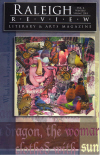Raleigh Review – 2014
The mission statement of Raleigh Review reads, “We believe fine art should challenge as well as entertain.” While many of the pieces in this issue fit the description of traditional poetry and prose, there are significant pieces of work that do indeed “challenge as well as entertain.” Throughout the journal, again and again we are presented with imagery in a modern style that drives the pace in bursts of short statements and thoughtful comments that ask to be revisited.
The mission statement of Raleigh Review reads, “We believe fine art should challenge as well as entertain.” While many of the pieces in this issue fit the description of traditional poetry and prose, there are significant pieces of work that do indeed “challenge as well as entertain.” Throughout the journal, again and again we are presented with imagery in a modern style that drives the pace in bursts of short statements and thoughtful comments that ask to be revisited.
If we read the pages in order, the first poem starts by making us feel as well as think; it is Dorianne Laux’s “Romance,” which begins, “I know we made it up, like god, but god / it hurts. . . .”
And in a most interesting production is a poem by Emily Wilson entitled “[from August on].” It looks and could read as a piece of fiction, but the lines and images give us the feel of a narrative poem. The structure itself challenges us through flashbacks and unspoken comments. Its final comment speaking to a Zen-like realization: “This is what my dad has learned of love: it is like owning the riverbed, but not the flow of the water.”
Similarly, “Room 44”, one of the finer pieces of fiction, by Gregory Josselyn, reads lyrically while generating images of work and people many of us can readily identify. The speaker’s view of a routine and unappreciated job is juxtaposed to her appreciation of her boyfriend’s work, and her admiration for his patience. “My boyfriend plays piano. I like saying that. My boyfriend plays piano. I like telling people at parties that the man who kisses my hip bone and pulls my hair out of the drain charges complete strangers £110 to watch him slam his fingers on a bunch of keys.”
Another challenging, if a bit disturbing, piece of fiction is Jacqueline Doyle’s “A Night with No Moon.” Burglars find more than they expected when they search the closets of a house for loot, finding instead a young woman’s unburied secret. We feel the fright a simple man feels as he re-tells that story and attempts to find reason in his own inaction in a past relationship:
“They say that the unburied will haunt you. I don’t know if it’s that baby or Joleen’s, but I can hear it crying sometimes in my sleep. I wake up in a sweat, my heart pounding. What could I have done?”
The editors have apparently gone to some lengths to choose fiction pieces that read like poems because the imagery, rhythm, and pacing come to us again in the failed balloon flight described in Susan Frith’s “Flight Over Paris.” A carnival balloonist carries on her late husband’s traditional performance, hoping that to rise in the balloon will allow her to rise above her feelings of loss and understand more of life, only to meet the same fate:
Sophie tosses out ballast. With each stone she buys another moment to look around. She thinks of her Jean. What did he notice on his last descent? For a time she has envied him this secret. She passes over a church steeple, sees a flower stall shut for the night, and wonders why an old woman is crying alone on her balcony. Things move faster now. Sophie crouches and crosses herself.
Finally, while the visual artwork only includes a few ‘teasers,’ the compositions by Debra Wuliger provide interesting viewpoints and perspectives that are both light and playful, offering an introduction to the written works. The journal is moving to biannual publication, so, hopefully, there will be more visual art as well as even more entertaining and challenging literature for us to enjoy.
[www.raleighreview.org]





